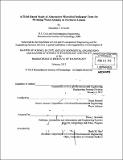A field-based study of alternative microbial indicator tests for drinking water quality in Northern Ghana
Author(s)
O'Keefe, Samantha F
DownloadFull printable version (12.82Mb)
Other Contributors
Massachusetts Institute of Technology. Technology and Policy Program.
Advisor
Susan Murcott.
Terms of use
Metadata
Show full item recordAbstract
Safe drinking water is essential for human survival, yet it is unavailable to over 1 billion of the world's people living in poverty (World Bank, 2009). The current methods used to identify drinking water sources are inadequate, with almost 40 percent of "safe" sources containing unsafe levels of microbial contamination (Joint Monitoring Programme (JMP) for Water Supply and Sanitation, 2010). Direct water testing is therefore necessary in order to accurately assess the safety of drinking water sources. The goals of this thesis are as follows: (1) To confirm the accuracy of the 20ml hydrogen sulfide (H2S) test as a single presence/absence (P/A) indicator for fecal coliforms; (2) To establish the accuracy of as a single enumerative test for fecal coliforms; (3) To verify the accuracy of the 20 ml H2S test used in conjunction with Easygel® as an improved method of quantifying contamination as compared with the individual tests; (4) To further confirm the accuracy of the EC-Kit as an improved method of quantifying contamination as compared with the individual tests; and (5) To use the results of an informal behavioral household interviews, and a performance review of the Community Water and Sanitation Agency (CWSA) to provide context and policy recommendations to improve access to potable water in Northern Ghana. Fieldwork for this research was completed in January 2011 in and around Tamale, Ghana. The author was hosted by Pure Home Water (PWH) and supported by the MIT Civil and Environmental Engineering Department. Overall, the 20 ml H2S presence/absence test was confirmed to be highly accurate for all types of water sources in Northern Ghana, as was the EC-Kit. The Easygel® and the H2S test combination is recommended solely for use when testing improved water sources. Additionally, field observations and a review of current policies of the CWSA demonstrate significant shortcomings in the ability of the Agency to supply rural areas with safe drinking water. Recommendations for improvement include more strict regulations of the levels and nature of foreign investment in Ghana's water sector.
Description
Thesis (S.M.)--Massachusetts Institute of Technology, Dept. of Civil and Environmental Engineering; and, (S.M. in Technology and Policy)--Massachusetts Institute of Technology, Engineering Systems Division, Technology and Policy Program, 2012. Cataloged from PDF version of thesis. Includes bibliographical references (p. 81-87).
Date issued
2012Department
Massachusetts Institute of Technology. Department of Civil and Environmental Engineering; Massachusetts Institute of Technology. Engineering Systems DivisionPublisher
Massachusetts Institute of Technology
Keywords
Civil and Environmental Engineering., Engineering Systems Division., Technology and Policy Program.